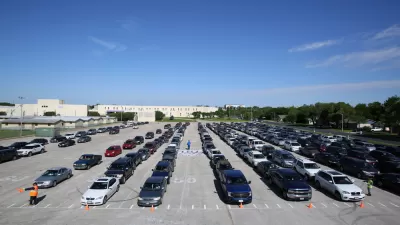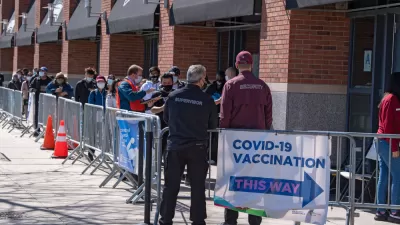The pandemic has created even more obstacles to participation in society for those without a car.

Madeline Brozen critiques the uses of drive-ins and drive-thrus as the chosen response for services during the pandemic, first noting how completely the concepts have caught on in an already car-centric country:
Given the convenience and privacy of the automobile, it is no surprise that drive-ins and drive-thrus have surged during COVID-19. This fall, people could traverse spooky Halloween drive-thru trails, visit drive-thru pet sanctuaries, and view entire independent film festivals from their cars. Governments and healthcare providers, meanwhile, are offering drive-thru food distribution, COVID-19 testing, and flu shots.
There's a big problem with the popularity of drive-ins and drive-thrus during the pandemic, according to Brozen: they're only available people that drive.
Without a car, you can’t see the elaborately carved pumpkins, smile at the rescue cow, or enjoy most outdoor movies. There are worse things, of course, than being denied access to a drive-thru burger, or to an Instagrammable haunted Halloween drive-thru. But it is much more concerning if you can’t get food from the food bank, or know if you have tested positive for COVID-19.
According to Brozen, the country already denies access to opportunity to those without automobiles, whether by choice or necessity, and the current trends would only strengthen those obstacles at the worst possible time. And like so many other consequences of auto dependency in the United States, both racial justice and social justice suffer as a result.
Brozen notes that the tendency toward driving-thru services during the pandemic is a set back for a growing movement in planning departments to slow the spread of auto-dependency by banning drive-thrus altogether. "Minneapolis, for example, prohibited the opening of new drive-thru facilities after 2019, saying they were inconsistent with the city’s long-term plans to reduce greenhouse gas emissions. A handful of other cities in California, Montana, and New Jersey have instituted their own temporary or permanent bans too," writes Brozen.
The source article offers a few policy prescriptions to ensure that drive-thrus and drive-ins don't exclude people without cars.
FULL STORY: Opinion: The Problem with Drive-In Services — Now and After COVID-19

Alabama: Trump Terminates Settlements for Black Communities Harmed By Raw Sewage
Trump deemed the landmark civil rights agreement “illegal DEI and environmental justice policy.”

Planetizen Federal Action Tracker
A weekly monitor of how Trump’s orders and actions are impacting planners and planning in America.

The 120 Year Old Tiny Home Villages That Sheltered San Francisco’s Earthquake Refugees
More than a century ago, San Francisco mobilized to house thousands of residents displaced by the 1906 earthquake. Could their strategy offer a model for the present?

In Both Crashes and Crime, Public Transportation is Far Safer than Driving
Contrary to popular assumptions, public transportation has far lower crash and crime rates than automobile travel. For safer communities, improve and encourage transit travel.

Report: Zoning Reforms Should Complement Nashville’s Ambitious Transit Plan
Without reform, restrictive zoning codes will limit the impact of the city’s planned transit expansion and could exclude some of the residents who depend on transit the most.

Judge Orders Release of Frozen IRA, IIJA Funding
The decision is a victory for environmental groups who charged that freezing funds for critical infrastructure and disaster response programs caused “real and irreparable harm” to communities.
Urban Design for Planners 1: Software Tools
This six-course series explores essential urban design concepts using open source software and equips planners with the tools they need to participate fully in the urban design process.
Planning for Universal Design
Learn the tools for implementing Universal Design in planning regulations.
Clanton & Associates, Inc.
Jessamine County Fiscal Court
Institute for Housing and Urban Development Studies (IHS)
City of Grandview
Harvard GSD Executive Education
Toledo-Lucas County Plan Commissions
Salt Lake City
NYU Wagner Graduate School of Public Service





























